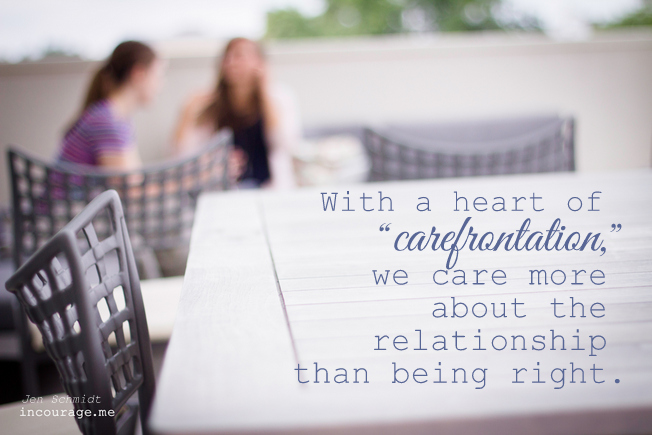Ironically enough, I woke that morning with a spring in my step.
The exhaustion of mothering our three stair-step babies had settled in, but amidst the chaotic, oatmeal in my hair and juice spilled on my pants, kind of day, a renewed passion stirred in my heart at the thought of taking my overwhelmed state and funneling it into a new ministry position.
I looked at the handwritten note that had just come in the mail from the ministry leader and smiled.
“What a great first week, Jen. I can’t wait to see what God will do this year as we encourage young moms. Thanks.”
I gathered my diaper bag, loaded up our three boys and headed to church for our team meeting. As I entered, I was surprised to find only a handful of the team already gathered in a small circle.
I sat down and immediately the leader began reading a Bible passage. I can’t remember it now, but I knew a problem must have occurred.
As she finished, there was an awkward silence. Being so passionately naive, I kind of chuckled and exclaimed, “Oh no, we already have an issue with someone? It’s only the first week.”
“Yes, Jen, I’ve prayed about this and sought counsel from others and I just don’t think this is a fit for you.”
Clutching my four-month-old baby, I felt like I was going to throw up. Had I heard her correctly? This was the same woman who just sent the note. Surely not. I was a young mom in love with serving my Jesus and this came out of the blue; a devastating sucker punch. Not only was I was shocked and confused, but after probing about her reasoning, no answer was given.
The meeting adjourned. I rustled up my toddlers from the nursery, and by the time I got them in their car seats, I put my head on the steering wheel and sobbed.
For the first time, I experienced that deep-down, soul-altering, barely-can-breathe kind of grief that only comes through a ministry type of betrayal. While I hadn’t developed a deep relationship with this woman, it still cut to the core because somehow I equated that time as a barometer of my love for Jesus. It was almost as if I heard her whisper, ”We don’t need your kind of encouragement,” cloaked behind some “Christian-ese words.”
Seventeen years ago, that meeting marked me.
My parents’ Christ-like modeling, written about in “Who Will Defend Me?”, sprang to the forefront of my mind. Over and over I prayed, “The Lord is the defender of my reputation.”
I contemplated launching a successful justice-oriented defense. I knew I’d “win” because this had been done so quietly without the entire leadership team’s knowledge, but I chose to stay silent and elevate the ministry over my own agenda.
I’ll be honest, my silence was a year-long struggle, and sometimes I wanted a medal for my self-imposed martyrdom, not the most Godly confession, I admit. I dove into studying the peacemaking principles on conflict resolution found in Matthew 18:15-16.
“If your brother or sister sins, go and point out their fault,
just between the two of you.
If they listen to you, you have won them over.
But if they will not listen,take one or two others along,
so that ‘every matter may be established
by the testimony of two or three witnesses.’”
Do you understand how much healthier the Body of Christ would be if we followed Jesus’s instructions?
Imagine how different this encounter would have been if this leader had come to me one-on-one as scripture stated, and shared her concerns with me. Would I have been hurt? Yes, but she would have been for me. We could have prayed together, talked it through and built on our relationship. All these years later and I still don’t understand what happened.
The first step is a private matter, not a communal one. We should never gather others around to discuss and confront first because often, it may be a misunderstanding that has taken flight.
I’ll try not to get on my soap box, but my heart is grieved when Christians circumvent God’s word, and determine their own interpretation. Instead of dealing with it in love, truth and compassion, we either tiptoe around it, push it under the rug, get everyone else’s opinion about the situation first, blog about it when it’s not our business or declare we just don’t want to be judgmental.
I no longer confront someone. Since 1997, that defining ministry moment opened the door for my heart of carefrontation.
In carefrontation, we desire to build and strengthen the Kingdom, not tear it down through caustic gossip hidden behind prayer requests and probing Christian sentiments.
With a heart of “carefrontation,” we care more about the relationship than in being right.

With a heart of carefrontation, we don’t approach with fingers pointed, ready for war, but rather, humbly approach with a heart of compassion and restitution. Carefronting seeks community building. It’s a heart ready and willing to look at ourselves and the fact that we may have done something to offend as well.
It’s hard and it requires great courage.
I no longer start a ministry year without first walking our group through the biblical model of confrontation. Practically, we talk through the biblical expectations to observe if any of us have a problem with one another.
I commit to holding their reputation close to my heart and vow that I will not entertain discussions about them with others from the group. “Your reputation is safe with me,” is my motto.
When someone approaches me about another, I immediately ask if they’ve approached their brother or sister in Christ. If they haven’t, I encourage them to go to him/her first before talking with others about their grievance. I take this approach in my everyday life with friends and relatives as well, and we’re teaching our children the very important steps of biblical conflict resolution.
Does it always go smoothly? I wish.
Have I always guarded my tongue? Regretfully, no.
Is this easy? Never, but it’s revolutionized my relationships.
Unfortunately, we live in a broken world where more are concerned about their rights than relationships. The biblical model of confrontation is a two-way street and both hearts have to be willing to lay down their own agendas to peacefully work toward a resolution. Whether or not you want to, it’s always the best option.
Today I’m grateful for that heartbreak because it refined my relationship with the Lord. It allowed me to follow His leading, rather than my own, and prayerfully determine how any difficult situation can ultimately bring glory to His name.


